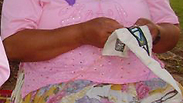
Palestinian women sew their way to independence
In addition to preserving Palestinian culture, traditional embroidery seen as way out of poverty.
"I enjoy this work and it enables me to make a living and raise my children," Darawi told The Media Line at the Al-Balad workshop in Jerusalem’s Old City where her work is sold. "I am responsible for seven women. I bring them the material and I teach them how to embroider."
Darawi’s intricate work uses bright colors and designs and is sewn onto purses, shawls, vests, and wallets. She says she works several hours each day while taking care of her two sons. She travels around the village, distributing and collecting the other women’s work, and brings it to Jerusalem, where it is sold.
"All of this work gives me courage," she says.
The shop just inside New Gate is just one project run by the Arab Orthodox Society, an NGO dedicated to helping and empowering Palestinian women. The Society provides the cloth and the thread, the women get paid per piece, and the coordinators like Darawi get an additional salary.
"We are trying to teach the women how to fish, not just to give them fish," Hala Jahshan, who runs the Balad shop, told The Media Line. "For many years, Palestinian women would take money or help without any dignity. We want to give women a chance to work and improve their skills."
Palestinian society remains traditional, and many men frown on women working outside the home. According to the Palestinian Central Bureau of Statistics, women make up only 18% of the labor force. Women marry young, and especially in the villages, have many children.
The work that is sold is all handmade, and prices are higher than in nearby shops in the Old City, where many of the goods come from China. The bulk of the customers are tourists, and therefore business is dependent on tourism. Nora Kort, the president of the Arab Orthodox Society, says that when tourism is good, the shop can employ up to 500 women.
These days, in the wake of the fighting between Israel and Hamas in the Gaza Strip, tourism has declined significantly and 150 women are employed. They each make about $200, which can go far in the West Bank where food is comparatively inexpensive.
"When many of these women come to us, they are broken," Kort told The Media Line. "When a man doesn’t work, he often takes out his anger on his wife. But once these women start working, I see the development of their feeling of value and self-worth."
She says many of the women use the money for their daughters' education, which especially pleases her. Although about one-third of the women she employs are either illiterate or have only a rudimentary education, most of their daughters attend university.
Messages of tolernace in embroidery symbols
Another employee at the shop is Suad Abu Sa’ada, a Christian mother of five also from Beit Sahour. She works as a tailor two days a week in the shop, as well as doing embroidery at home. In her spare time, she helps her husband in his tourism shop in the village.
"Life is very expensive for us and it is not possible to survive on just one income," she told The Media Line. "I feel good when I can help my husband with money and we can provide for our children."
Beyond the employment aspect, the Balad shop helps keep Palestinian tradition alive. While most women used to wear hand-embroidered dresses, many today wear Western clothes, or machine-stitched imitations.
Kort says she sees the shop as a way of preserving traditional Palestinian culture, and helping to build a Palestinian identity.
"Palestinian skills and crafts have died out because of the competition with China," she told The Media Line. "Chinese items are all over the place and they’re very cheap. We revive the culture in a loving way. It’s like a baby that you pamper."
The traditional embroidery was done with red thread, says Jahshan, a reminder of the importance of blood tribes. Palestinians in the Ramallah area still prefer these traditional designs. Americans like blue, while Israelis prefer colors that refer to nature, like greens. Some of the pieces for sale in the shop have intricate designs of flowers and clouds, while others sport the more traditional geometric designs.
Besides the embroidery project, the Arab Orthodox Society has a medical clinic in a building owned by the Greek Orthodox Church, a new museum of Palestinian culture, and a bakery which serves traditional Palestinian sweets. Kort says her goal is for the various projects to make enough money to cover their expenses, a goal she hasn’t yet reached.
Kort says she sees the traditional embroidery as a way to unite all three religions in Jerusalem. Many of the shop’s customers are Israeli Jews, a few of whom have even asked for embroidery lessons. The women who sew are both Christian and Muslim.
"Religion is important to us but not religious fundamentalism"” Kort says. "Religion is tolerance, love and peace, and I read a lot of these messages in the symbols of the embroidery."
Article written by Linda Gradstein.
Reprinted with permission from The Media Line.










